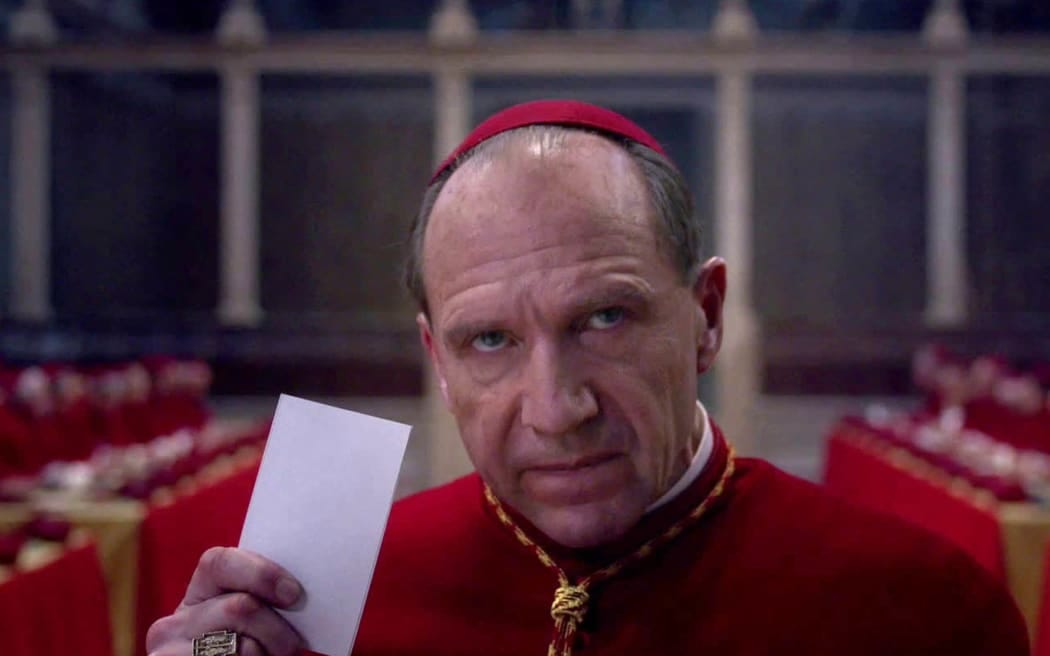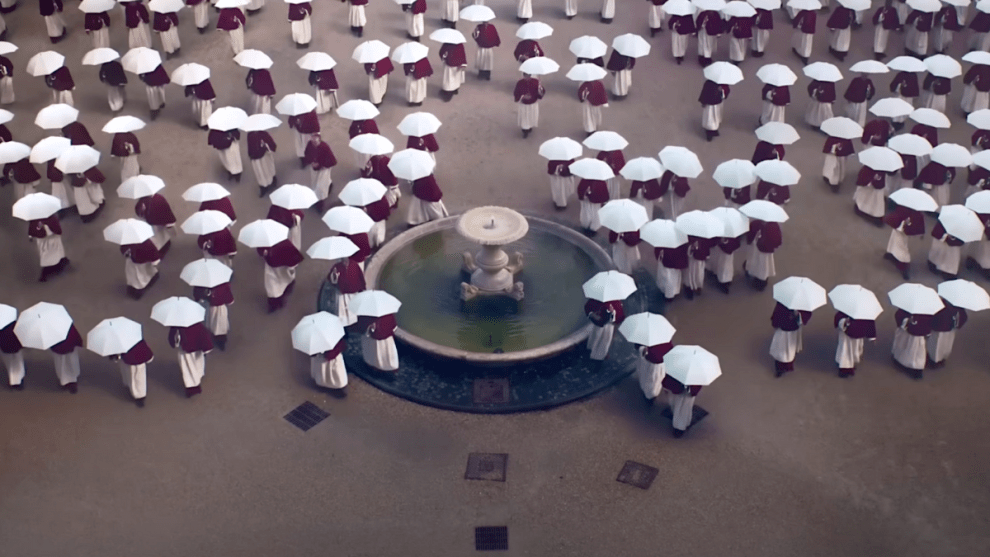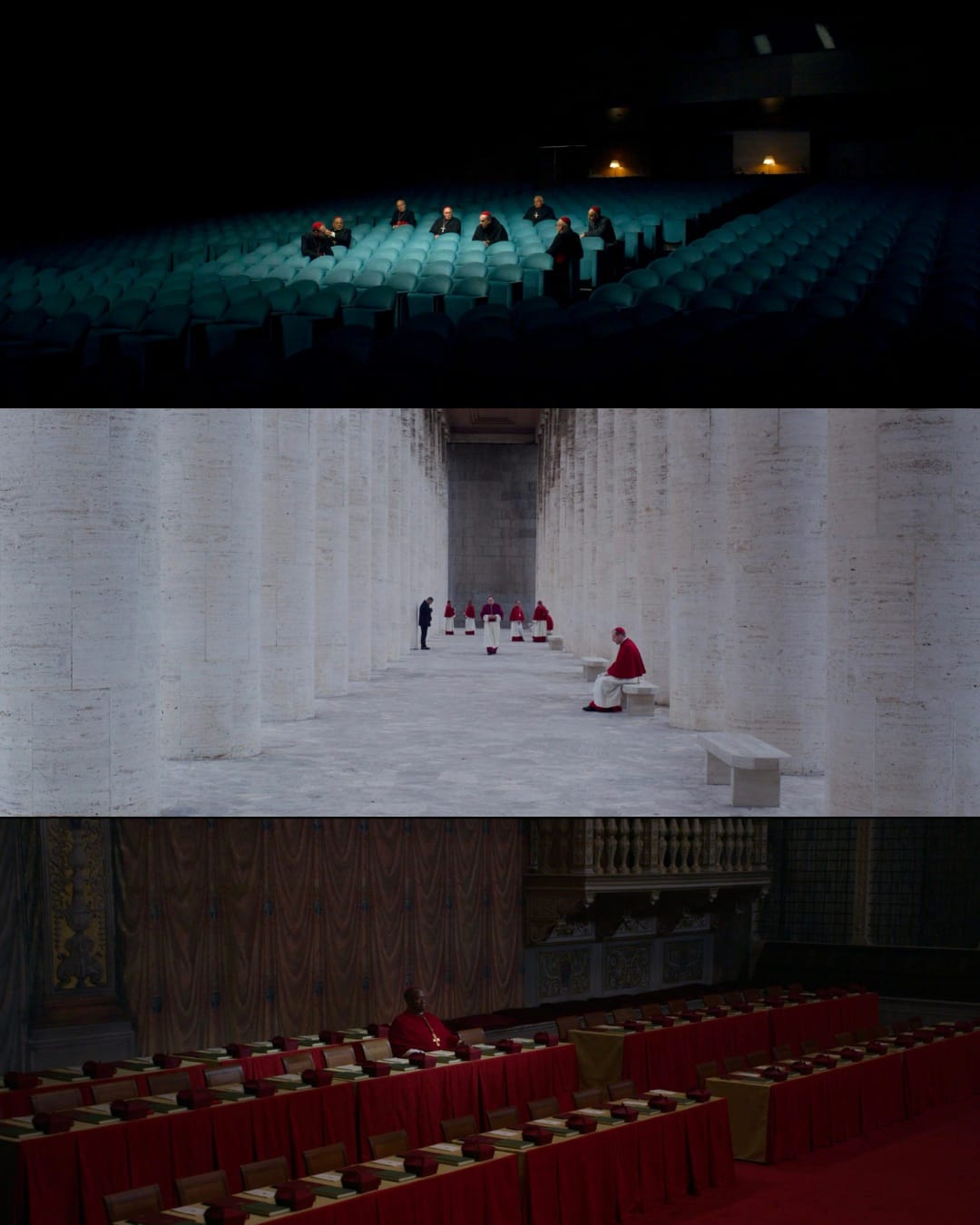Conclave and the Antichrist
Liberalism is so committed to self-negation that it welcomes its own destroyer
SPOILERS
I was expecting a different ending to Conclave. I expected our earnest and exceedingly humble protagonist Cardinal Lawrence to finagle his way into the Papacy, and for the entire narrative to be transformed: he was an unreliable narrator all along and used his role as Dean to further his white-hot ambition. The Cardinals accusing him of ambition were right. He screamed innocence all the while undermining each Pope-hopeful in a subtle Machiavellian scheme rather than some well-intentioned if overreaching desire to run a worthy conclave. Perhaps he was even in cahoots with Sister Agnes to set up Cardinal Tremblay.
The moment Lawrence volunteered his Pope name to his fallen rival Cardinal Bellini — “John” he said, without hesitation, despite furiously protesting he had no such name in a prior interaction — I thought, it’s him.
Not only would this be a narrative coup — an unreliable narrator in plain sight, a malevolent inversion — but it would reveal the Church to be made of fallible men all the way down. No floor to the conniving, the pride, the ambition of its keepers. The Sistine Chapel itself explodes as Lawrence casts his vote for himself in a sign of God’s wrath with his deceitful servant. Bordering on the nihilistic, this would not have been a flattering portrayal of the Catholic Church, but it would have been a deeply human one. It would hardly have been the first time the Papacy was occupied by a deeply ambitious or flawed man. We’ve had worse, as Bellini tells Lawrence.
But that’s not what happens.
Cardinal Benitez wins the Papacy. A surprise Mexican Cardinal, unbeknownst to the others, emerges from Kabul (of all places) in the moments ahead of the conclave — to win. What secures his election, aside from the self-obliteration of his rivals, is his speech after a terrorist attack. Like a quiet Job standing up against the whirlwind of God, he stands against the furious bellicosity of Cardinal Tedesco, the reactionary villain of the story. Tedesco urged religious war against the Islamification of Europe in a speech that lends force to this villain, ranking not far behind Colonel Jessup’s You can’t handle the truth speech from A Few Good Men. Instead Benitez preaches peace. He urges his Brother Eminences to look not at the terrorists ravaging Christendom but at themselves instead:
(In Latin) Would you say we have to fight? What is it you think we’re fighting? Do you think it’s those deluded men who had carried out these terrible acts today? No, my brother. (In Spanish) The thing you’re fighting is here… inside each and every one of us, if we give in to hate now, if we speak of “sides” instead of speaking for every man and woman. This is my first time here, amongst you, and I suppose it will be my last. Forgive me, but these last few days we have shown ourselves to be small petty men, we have seemed concerned only with ourselves, with Rome, with these elections, with power. But things are not the Church. The Church is not tradition. The Church is not the past. The Church is what we do next.
Talk about a damp squib. (Did Aaron Sorkin write this?)
Forget the men behind the explosions in Louvain, Munich, and Rome that scattered the Cardinals and blew the glass out of the Sistine Chapel to fall upon them like sulphureous rock. Catholicism is under physical attack across Europe. The Cardinals are as beset by demons as the angels in Paradise Lost:
From those deep-throated engines belched, whose roar
Embowelled with outrageous noise the air,
And all her entrails tore, disgorging foul
Their devilish glut, chained thunderbolts and hail
Of iron globes, which on the victor host
Levelled, with such impetuous fury smote,
That whom they hit none on their feet might stand,
Though standing else as rocks, but down they fell
By thousands, angel on archangel rolled;
Yet, as they sit covered in dust and blood, this quiet stranger Cardinal asks them to look away from these demons. Look inwards, this man of peace urges.
Who is this man of peace who ascends St Peter’s throne? Who whispers enough truths to hide the monstrosity of his suggestion? He is the Antichrist.
From Daniel 8:25:
And through his policy also he shall cause craft to prosper in his hand; and he shall magnify himself in his heart, and by peace shall destroy many:
Hear the magnification in his heart in Benitez’s words that close the film:
I am what God made me. And perhaps it is my difference that will make me more useful. I think again of your sermon. I know what it is to exist… between the world’s certainties.
Or take 2 Thessalonians 2:3-4:
Let no man deceive you by any means: for that day shall not come, except there come a falling away first, and that man of sin be revealed, the son of perdition;
Who opposeth and exalteth himself above all that is called God, or that is worshipped; so that he as God sitteth in the temple of God, shewing himself that he is God.
Benitez literally ascends to the throne of St. Peter, which is symbolically sitting “in the temple of God.” His softly spoken message of peace veils his exaltation, as he positions himself as the moral voice above the Church itself.
Or Revelation 13:11-12:
And I beheld another beast coming up out of the earth; and he had two horns like a lamb, and he spake as a dragon.
He appears meek (a lamb) but speaks with great and dangerous authority (a dragon). Benitez is mild, peaceful, and humble in appearance, yet his words are profoundly transformative and dangerously subversive.
Modern liberalism is so committed to self-negation that it welcomes its own destroyer. Benitez’s victory is not a ‘win for peace’ but rather a theological catastrophe.
This is a far darker (and less interesting?) ending to Conclave than the surreptitious elevation of Cardinal Lawrence. Instead of the Papacy falling to the follies of man, the petty squabbles of its mortal Cardinals, it falls to the devil, to the Antichrist. And he (she?) arrives preaching peace, let in by the Church’s liberals, laid low by its linguistic fragmentation after its own Tower of Babel. This was one of the profound and I suspect overlooked parts of the film, when Tedesco laments the state of the conclave:
Lawrence: Our new brother…
Tedesco: Did I hear correctly, Afghanistan?
Lawrence: Yes. A marvelous testament to the Universal Church, so many men of different cultures, races, bound together by their faith in God.
Tedesco: (snorts with laughter). Look around you. Notice how everyone gravitates to their fellow countrymen. Italians over here. Spanish speakers there, English there. French. Divided by language. When we were boys and the Tridentine Mass was still the only true liturgy of the world, we would all have been speaking Latin. But then your fellow liberals insisted we get rid of that “dead” language. Without Rome, without the tradition of Rome… Things fall apart. The centre cannot hold.
We see through the film that Tedesco is right. The Church is fractured. Every conversation is in several languages (I presume half the Cardinals don’t understand what’s being said half the time). Catholic cities are besieged. In seeing the Church’s division and calling the Church to arm against its foes, Tedesco is the hero of the film, however flawed and inadequate. Inadequate because he is ultimately vanquished by liberalism in the guise of the androgynous Antichrist.
This is my reading, but I suspect a conventional reading goes something like: modest Cardinal arrives, preaches peace against reactionary hellfire, is elevated to the Papacy. A win for liberalism and the early 2020’s obsession with gender ambiguity. Perhaps. However, it would be a disappointing end to an otherwise stunningly shot and exhilarating film to be marred by the faddish morality of the moment.
Or perhaps it’s deliberately a Rorschach test, existing between certainties. But if you are left as unsettled as Lawrence as he looks upon his new Pope with fear and trembling, then perhaps you are willing to countenance the most terrifying interpretation of all. That the centre cannot hold, and it falls irreversibly to evil.





Good article. Interesting as I have wondered what to make of the ending. I agree with you that Lawrence being elevated was what I expected and would have made for a grim and cynical but enjoyable commentary on the Church and man’s ambition. As it was I was baffled by the ending—is it just some libtard crap or is there something deeper?
Also I agree Tedesco is the hero of the movie but only myself and one other from our group thought that!
This sounds like a discarded draft from the “Left Behind” series. Many of the Protestants I grew up amongst already thought the Pope was the AntiChrist.
I thought “Conclave” was too kind to the Catholic Church. I see a bunch of commenters blaming the Church’s decline on the fading of the Latin Mass. Perhaps the systematic cover up of mass child rape may also have impacted this institution’s reputation?